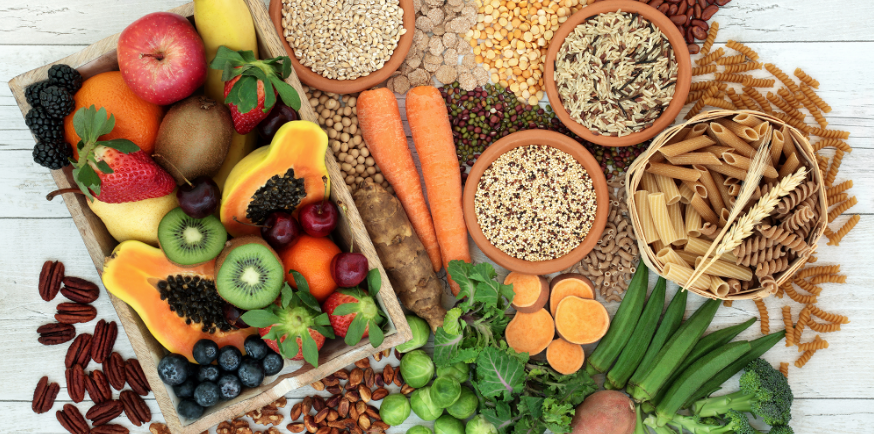Fiber doesn’t always get all the attention it deserves. When people use the term “healthy balanced diet”, they mostly think about minerals, vitamins or antioxidants. Fiber is usually left out, when in fact it is a very important element for a balanced and healthy diet. We’re going to discuss its benefits below, but until then, let’s have an overview look at why fiber is important for us and why health authorities recommend a daily dose of 38 grams of fiber for men and 25 grams of fiber for women.

Table of Contents
- Why is fiber important and good for you?
- Dietary Fiber Benefits
- 1. Fiber can aid in Weight loss
- 2. Fiber can also help to Maintain weight
- 3. Fiber helps to Increase bone health
- 4. Fiber promotes Natural detoxification of the body
- 5. Fiber might reduce the risk of cancer
- 6. Fiber can reduce the risk of type 2 diabetes
- 7. Fiber might lower the odds of heart disease
- 8. Fiber promotes the growth of good gut bacteria
- 9. Fiber might lead to Increased longevity
- 10. Fiber helps prevent constipation
- Conclusion
Why is fiber important and good for you?
Fiber is extremely important and good for our overall health (1). We’ll discuss the several benefits of fiber further down in this article. But first, we need to explain the different types of dietary fiber. The non-digestible carbohydrate called fiber can be split into two categories: soluble fiber and insoluble fiber. As you might guess from the naming, the first type of fiber dissolves into water, while the latter doesn’t.
Insoluble fiber is usually found in nuts, fruits and different kinds of vegetables. Because it doesn’t dissolve in water, the insoluble fiber goes directly into the digestive system where it bulks helping stimulate bowel movement and thus preventing constipation or other complications, like hemorrhoids.
Soluble fiber, on the other hand, is quite soft and can be easily absorbed in the bloodstream. We can get good amounts of soluble fiber from beans, oats, avocados and other types of fruits. Soluble fiber is good at regulating blood sugar levels and it is also a very good guardian against cholesterol and heart diseases. It also helps the population of good bacteria in the gut digest food more easily. This is why soluble fiber is also thought to contribute to a better immunity system, temper down inflammations and even enhance your overall mood.
Dietary Fiber Benefits
Now, let’s get down to the specifics. These are the 10 fiber benefits you should take seriously
1. Fiber can aid in Weight loss
If the only dietary change you make is increasing your fiber intake, you would lose weight (2). If you are on a diet, you are required to get at least 30 grams of fiber daily without any other factor being taken into consideration. Once you consume foods rich in fiber, not only will you feel full, you will also feel satisfied for much longer. Fiber also binds with many other nutrients in your meals, preventing your body from absorbing some of the calories in those meals (3).
2. Fiber can also help to Maintain weight
Losing weight is actually easier than maintaining it. We all know it. Acquiring a good habit is easier than sticking to it. However, how difficult could it be to keep a steady daily intake of fiber? Truth is, fiber can be a good ally in maintaining your desired weight (4), the one you’ve been struggling to achieve for so long. The constant binding of fiber to the nutrients and calories in our meals means that we get the right amount of nutrients required to maintain a healthy weight.
3. Fiber helps to Increase bone health
Some types of soluble fiber known as prebiotics are found in oats, asparagus, leeks, wheat, and soybeans. They increase the bioavailability of minerals like calcium in the meals you consume, which helps to maintain good bone density, primarily in postmenopausal women (5) & adolescent girls (6).
4. Fiber promotes Natural detoxification of the body
Fiber certainly promotes the elimination of toxins from your body (7). Soluble fiber draws up possibly harmful compounds like unhealthy fat and estrogen before the body can absorb them. Because insoluble fiber makes things move quickly in the intestines, it reduces the amount of time that substances like pesticides, mercury, and BPA stay in your body. The faster these chemicals move through your body, the lesser the harm they can do to your body.
5. Fiber might reduce the risk of cancer
Fiber might reduce your chances of contacting different cancers like breast cancer, colorectal cancer, and ovarian cancer (8). Fiber-rich foods also have antioxidants and phytochemicals that can reduce the odds of cancer. However, there is no strong evidence if Fiber actually helps reduce the risk of cancer (9).
6. Fiber can reduce the risk of type 2 diabetes
Fiber (primarily high viscous soluble fiber) keeps blood sugar levels steady and helps you maintain a healthy weight, which helps prevent the development of diabetes (10, 11). Type 2 diabetes, as well as other types of diabetes, is a result of increased blood sugar and obesity. With the consumption of fiber, you can reduce the amount of sugar and nutrients consumed by the body.
7. Fiber might lower the odds of heart disease
By making fiber a constant part of your diet, you might reduce the risk of heart disease by almost 10% (12, 13). The heart is the epicenter of your body, some might say. One of the major challenges for our hearts is the buildup of cholesterol. Cholesterol comes from excess fat, which builds up and clogs the arteries. This is quite bad because our arteries are responsible for carrying oxygen-rich blood and nutrients from the heart to the rest of the body and this whole process is essential for maintaining a healthy body. A recommended daily dose of fiber can keep cholesterol at bay and thus promote healthy living (14, 15).
8. Fiber promotes the growth of good gut bacteria
Fiber (primarily soluble fiber) feeds the good gut bacteria and helps them flourish well (16). When a gut bacteria feeds on fiber – whether fermented or not – in your GI tract, they produce fatty acid (short-chain), which lowers the risk for inflammations, and reduces obesity, which is linked to many chronic health challenges we face today (17). Gut bacteria is essential for the good functioning of our body.
9. Fiber might lead to Increased longevity
We live in an ever-growing and evolving world and we seem to have less and less time for ourselves. Large-scale food processing has transformed our food in ways we might regret in the future. We no longer have time to spend 2-3 hours a day properly cooking healthy meals; instead, we buy the processed ones. What does this mean? Well, researches show that over 70 million Americans constituting about 26.9% of the population are obese these days and it’s on the rise (18). Moreover, it has been proved obesity can shorten your life expectancy rate (19), and if there is anything that can change that factor, it should be a welcome development. Regular and regulated fiber consumption helps you reduce your level of cholesterol as well as the level of fat and sugar. This way, you have an increased life expectancy rate, and you also live healthier as well.
10. Fiber helps prevent constipation
Fiber helps with bowel movement which is essential for the overall good health of your digestive system. Constipation is one of the most common G.I complaints in the United States of America. Dietary Fiber has shown to increase stool frequency in patients with constipation (20). However, there is another conflicting study that shows a reduction in Idiopathic constipation by lowering your fiber intake (21).
Conclusion
The bottom line is, eat more fiber. It has got a ton of benefits for your body. Moreover, you will really see the results of a fiber-rich diet in the future. One final advice: don’t forget to drink water. Fiber works best when it absorbs water, working to prevent constipation and other digestive tract complications.
All in all, we all owe it to ourselves to take care of our bodies and minds, wouldn’t you say so?
